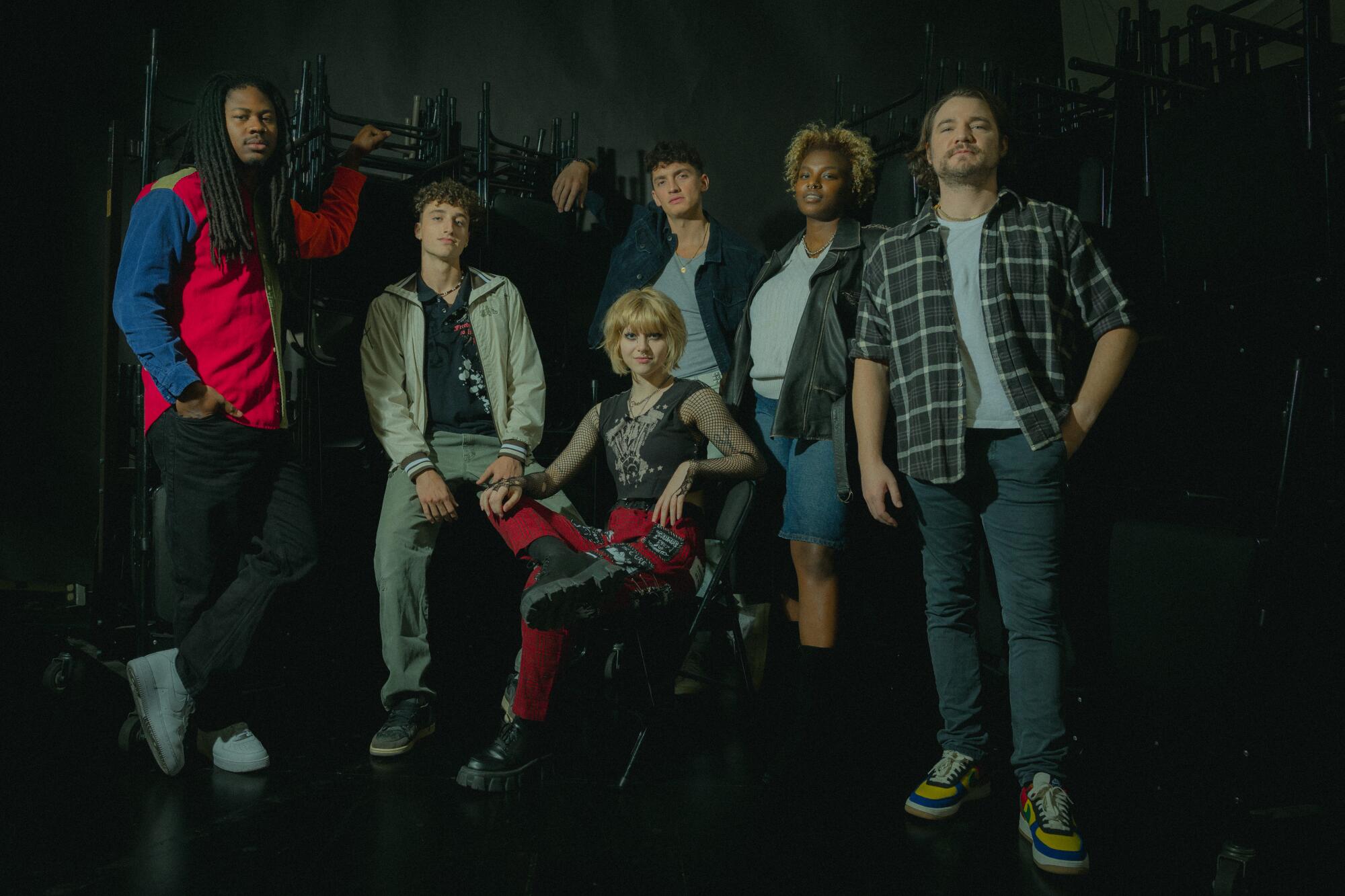
- Share via
There’s a scene in “American Idiot” when Will, a young man about to start a new life in the city with his friends, receives the unexpected news that he’s about to become a father. He gets left behind in their suburban hometown and, as outlined by the lyrics of “Give Me Novacaine,” he’s all at once feeling stuck, restless and desperate for a release — a specific sentiment that’s difficult to illustrate onstage.
Or is it? Audiences of an upcoming Los Angeles revival of the Green Day musical — performed simultaneously in spoken English and American Sign Language — will see Otis Jones IV planted on a sofa, his hands signing with a palpable frustration, and James Olivas running in circles, belting out the ballad with an audible angst. Both actors — one Deaf, one hearing — are playing Will in the show, and together, their performances arguably explore the nuances of this scene more fully than ever before.
“We all know the feeling of having multiple voices in your head and feeling like they’re really pulling you in different directions,” said choreographer Jennifer Weber.
“That is exactly the subtext we’re interested in exploring here: How can we use all the languages at our disposal to get at the heart of these characters and where they are at each moment of this story?”
The latest installment of Pacific Standard Time, the museum series that this year is titled ‘PST Art: Art & Science collide,’ has arrived. Here’s our shortlist of exhibitions and events.
This staging of “American Idiot” is a landmark production for L.A. Running Oct. 2 through Nov. 10, the Center Theatre Group and Deaf West Theatre collaboration marks the reopening of the Mark Taper Forum after a yearlong hiatus, the first full season programmed by newly appointed CTG Artistic Director Snehal Desai, and Desai’s CTG directorial debut. That its run aligns with the politically charged punk rock album’s 20th anniversary and a significant presidential election is no accident.
“It’s a unique piece of theater to begin with, and even if they’ve seen it before, this is a very, very different take,” Desai told The Times after the production’s two-week workshop in late July.
“It may not be everyone’s cup of tea, but I’m going to ask folks to give it a chance because, as things are more extreme than ever and we’re facing another very pivotal election in our country’s history, what we’re all going to need this fall is a place to escape, be in community and scream.”
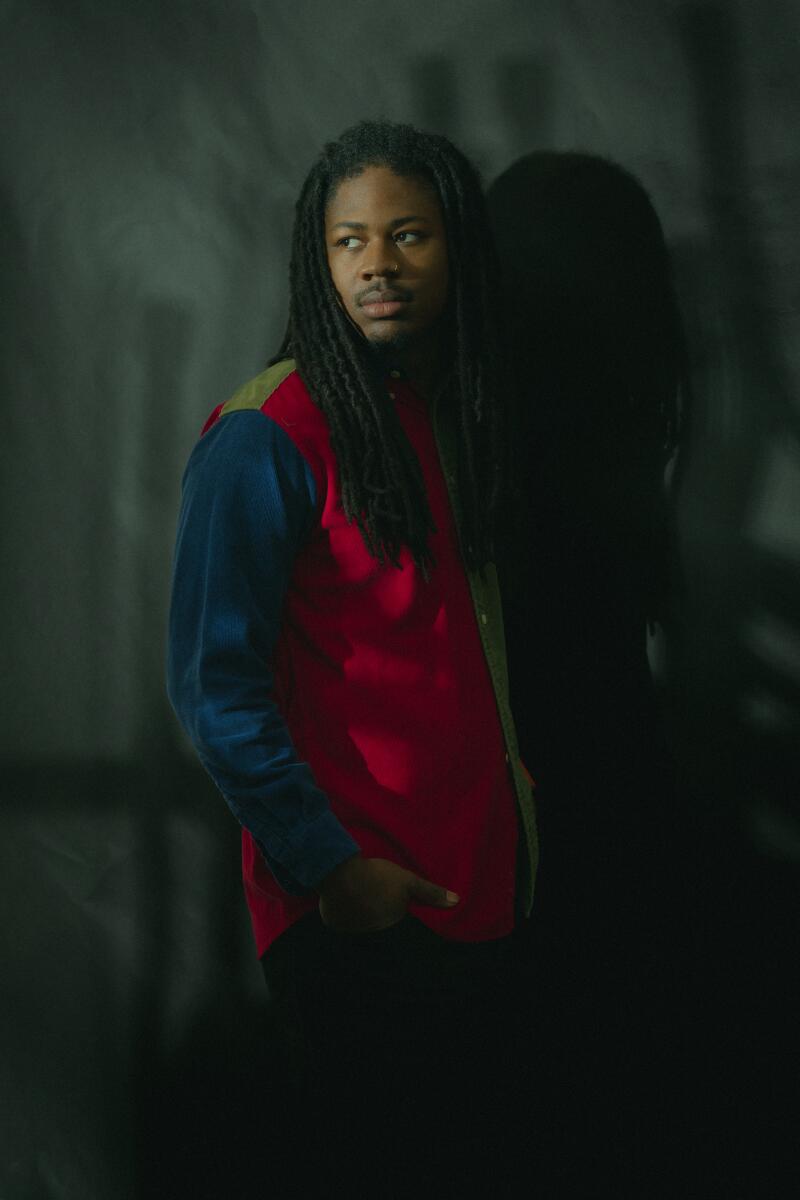

Together, Otis Jones IV and James Olivas play Will in “American Idiot.” (Jason Armond / Los Angeles Times)
That this staging of “American Idiot” is a bold and timely endeavor is appropriate, given the show’s origins. The musical, based on the Bay Area trio’s 2004 album of the same name, was its own big swing: a concept album about an exasperated, lower-middle-class adolescent coming of age in a period shaped by George W. Bush’s presidency, the Sept. 11 attacks and the Iraq War.
“I think everybody’s confused about the climate nowadays,” said singer-guitarist Billie Joe Armstrong — who makes up Green Day with drummer Tré Cool and bassist Mike Dirnt — to The Times in 2004. “[The album]’s about the confusion of what it’s like to be an American.”
“American Idiot” was a critical and commercial hit, winning Grammy Awards for rock album and record of the year (“Boulevard of Broken Dreams”). And with more than 23 million copies sold to date, the album remains a millennial touchstone for its tuneful expressions of anger and alienation.
“Growing up queer and brown in small-town America after 9/11, this album played a big role in my life,” recalled Desai, who is of Indian descent and was raised in Quakertown, Penn.
“I kept listening to it over and over again because I felt so on the periphery; people who look like me are no less American, but we were perceived so differently. This album was hitting at the restlessness and rage and powerlessness I was feeling, while also being so unafraid to question what it means to be American during that fraught and scary time in our country’s history.”
The world just experienced its hottest year on record, but does our climate crisis make for good art? With the latest iteration of Pacific Standard Time, we’ll soon find out.
The musical adaptation premiered in 2009 at Berkeley Repertory Theatre ahead of a yearlong Tony-winning run on Broadway. It expanded the album’s solo journey to that of three disenfranchised young men without adding a line of scripted dialogue between 20 Green Day songs.
“It’s a complicated story, and it’s ambiguous,” director Michael Mayer told The Times at the time. “The closest example is opera, because the songs have to do everything.”
The themes of “American Idiot” resonate deeply with the Deaf community, as “we grew up used to being in a place where the world probably doesn’t listen to us and doesn’t understand what we’re about,” said Deaf West Theatre Artistic Director DJ Kurs.
“And the role of media in people’s lives that ‘American Idiot’ predicted 20 years ago is more relevant than ever for the Deaf community, because social media is a way for us to connect with each other and the larger world.”
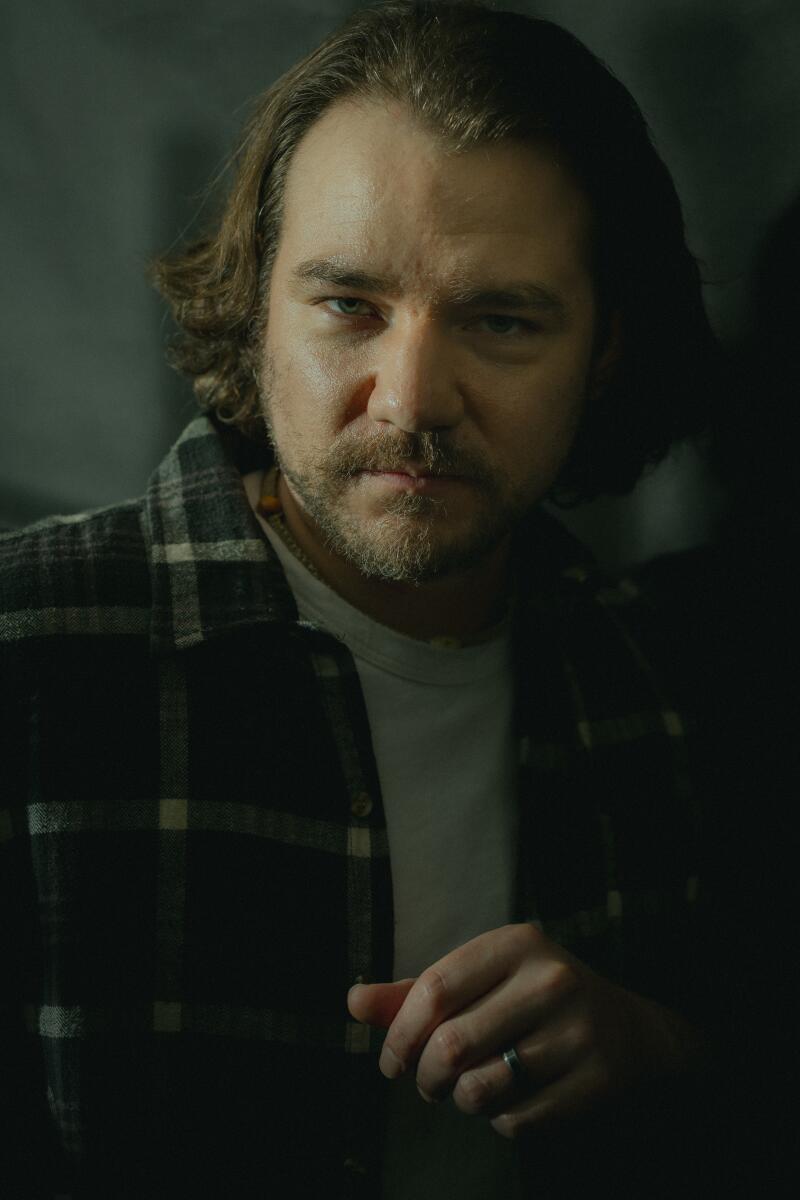
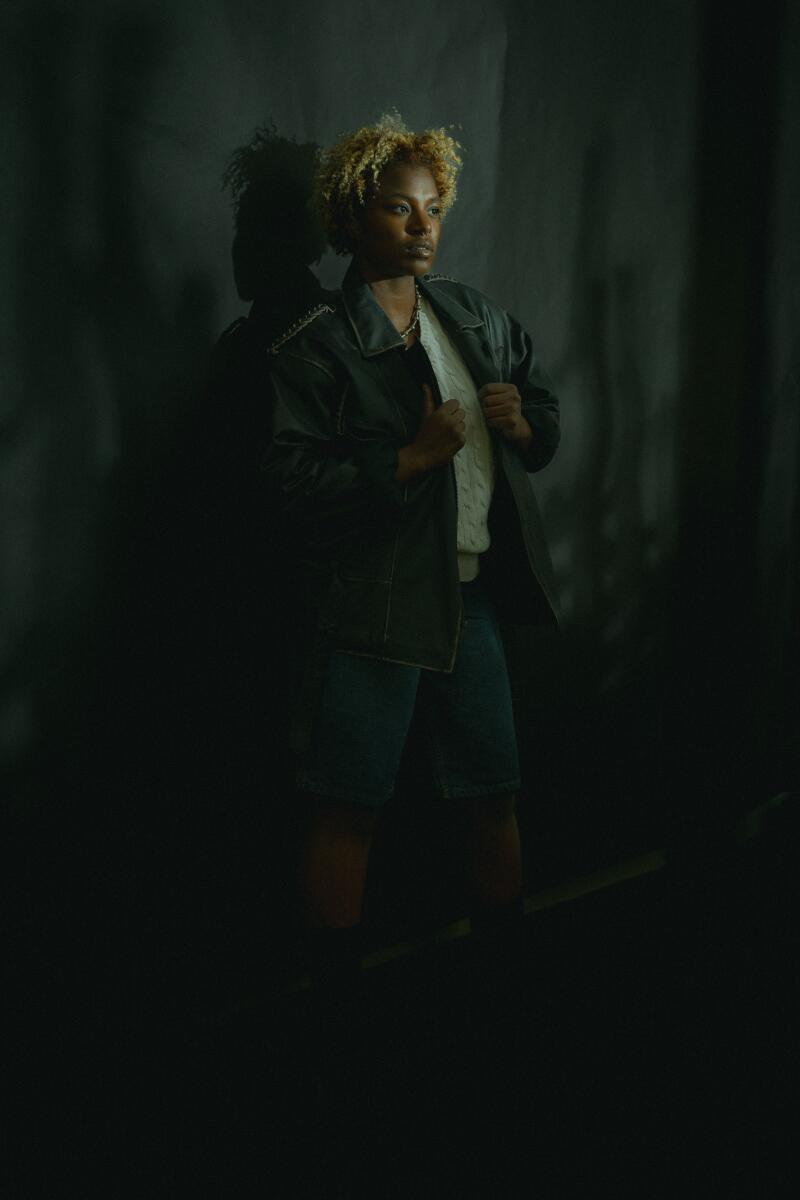
Daniel Durant and Mars Storm Rucker play Johnny and Whatsername, respectively, in “American Idiot.” (Jason Armond / Los Angeles Times)
Thanks to all the technology used to hear music — audio captions on Instagram and Tiktok, bass-boosting headphones, cochlear implants, hearing aids and more — today’s generation of Deaf people are expressing themselves by uploading videos of their ASL covers.
“I grew up with a hearing family and often felt very alone as a Deaf person,” Jones said. “I started posting covers of R&B and hip-hop songs online five years ago, and it helped me find the Deaf community I had been looking for, as well as a connection to a whole hearing audience I didn’t know I could have.”
Such ASL covers will play around the Taper at the top of this “American Idiot” production, which is intended to be fully accessible to Deaf and hard-of-hearing audiences through projected subtitles, performed American Sign Language and boosted bass for feeling the music’s vibrations. (Earplugs will be available upon request.)
Some moments are solely signed for a reason, said Desai: “If you know sign, you’ll get it; if you don’t, you’ll have an entrance to what it means to be Deaf in a world that is constantly speaking at you.”
Fall’s most anticipated books include novels from Rachel Kushner, Sally Rooney, Danzy Senna, Michael Connelly and Richard Price.
Because this “American Idiot” resets the story in the present day, the original production’s archival clips of former President Bush will be replaced by that of other former presidents, as done in various stagings of the musical.
It also recenters the musical on three Deaf friends in today’s hearing America, which immediately heightens the stakes of their stories: How does it feel to be in a relationship with a hearing person who refuses to learn sign language? What does it mean for a Deaf person to want to join the military, which still doesn’t allow Deaf people to enlist?
Previous Deaf West Theatre musicals generally doubled major roles with one Deaf actor and one hearing actor performing the exact same narrative or emotional detail of a scene. But in “American Idiot,” a show in which much of the conflict is interior, the two actors who play the same role will regularly communicate dissimilar thoughts and feelings and even appear at odds with each other, as in the “Give Me Novacaine” sequence.
“These three characters each have inner battles about what they thought their dreams would look like and how their lives can change based on one decision,” explained ASL choreographer Colin Analco.
“When they’re feeling self-destructive, or unsatisfied with where they are in life — we want to explore those dynamics through our combination of dance and sign language. The sky’s the limit of how we can use movement as storytelling here.”


Landen Gonzales plays Tunny in “American Idiot.” Lark Detweiler is in the ensemble, and is also the show’s dance captain. (Jason Armond / Los Angeles Times)
Throughout the production, sign language is performed by the entire cast of 20 actors, about half of whom are Deaf or hard-of-hearing. “Watching all of the hearing actors learn sign language for this has been so exciting,” said Lark Detweiler, a Deaf actor who is also the show’s dance captain. “It’s so cool to see people who care that much to work really hard to get it right.”
Keep an eye out for the choreography during the production’s instrumental sections. “There are quite a few moments in the ‘American Idiot’ score that don’t have lyrics,” said Weber. “We want to physicalize that sound for our Deaf audiences, and make it so they can see the music and experience it along with hearing audiences.”
“It’s not about gimmickry,” added Kurs. “It’s about using actual tools to honor the spirit of a revival — taking old material and doing something new with it, and figuring out what works best for each section of the story.”
The much-anticipated reopening of the Mark Taper Forum, ‘Lightscape’ at Disney Hall, a big debut in San Diego: Here’s our shortlist to the most promising shows in the season ahead.
“American Idiot” is the fourth collaboration between Center Theatre Group and Deaf West Theatre, after 2009’s “Pippin,” 2007’s “Sleeping Beauty Wakes” and 2003’s “Big River.” That first show went on to Broadway, earned two Tony nominations and completed a national tour. That “American Idiot” is the first production of Desai’s debut season at CTG is, as he called it, “very intentional.”
“A lot of people look at an artistic director’s first season as a cue for where we’re going,” Desai said. “I wanted to make sure we acknowledged our place in the L.A. theater community and the legacy and history of those relationships.
“I also wanted to put us on a new path in terms of what we are doing at CTG, artistically,” he added. “It was important to me to create space for the next generation of performers at CTG. With this production, a third of our actors hadn’t been born when 9/11 happened; this was their first professional workshop. Altogether, I hope this will kick off this next chapter of CTG in a really dynamic way.”
'American Idiot'
Where: Mark Taper Forum, 135 N. Grand Ave., L.A.
When: 8 p.m. Tuesdays-Fridays, 2:30 and 8 p.m. Saturdays, 1 and 6:30 p.m. Sundays. Runs Oct. 2-Nov 10. (Call for exceptions.)
Tickets: Starts at $35
Info: (213) 628-2772 or centertheatregroup.org
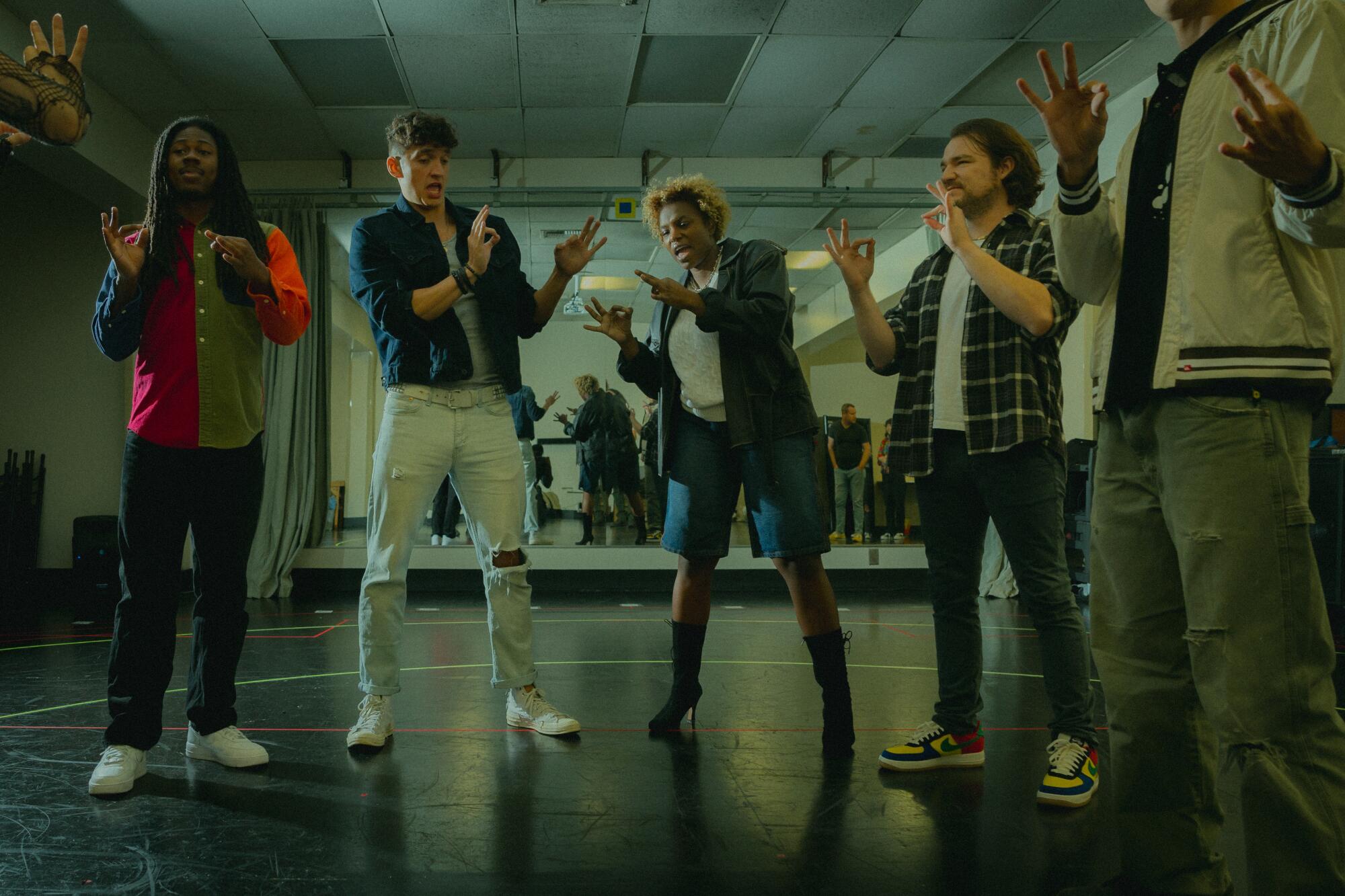
More to Read
The biggest entertainment stories
Get our big stories about Hollywood, film, television, music, arts, culture and more right in your inbox as soon as they publish.
You may occasionally receive promotional content from the Los Angeles Times.
















